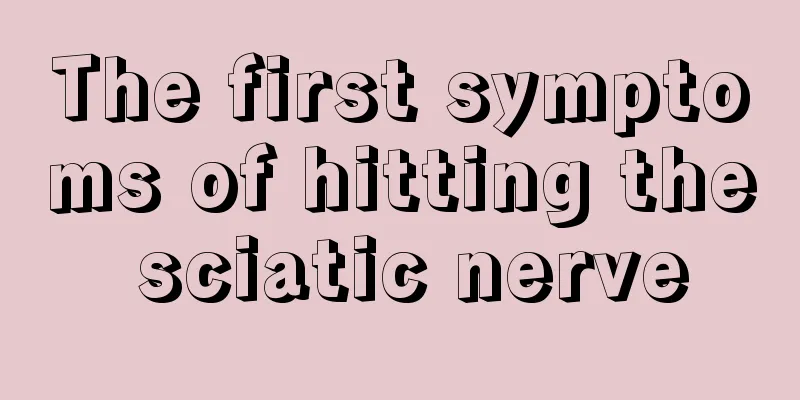What are the symptoms of hepatic coma?

|
The liver is an important part of the body. Many bad living habits may lead to liver disease, such as frequent smoking and drinking. There is a kind of liver disease called hepatic coma. Once hepatic coma occurs, it may cause mental loss and do things that you are not even aware of, such as scribbling, spilling water, etc. Many hepatic coma patients miss the best treatment time because they do not understand the symptoms of the disease. Here I will share with you the symptoms of hepatic coma. 1. Behavioral changes Initially, it may be limited to some "careless" behaviors, such as scribbling, splashing water, spitting, throwing paper scraps and cigarette butts, touching and searching everywhere, urinating and defecating anywhere, dragging and placing tables and chairs around the room, and other meaningless actions. 2. Changes in sleeping habits It often manifests as sleep inversion, also known as impending coma. Some people have found that this phenomenon is related to the disorder of the phase of serum melatonin secretion in patients, indicating that the excitement and inhibition of the patient's central nervous system are in a disordered state, which often indicates that hepatic encephalopathy is imminent. 3. The appearance of liver odor It is a characteristic odor caused by liver failure, in which the intermediate products of sulfur-containing amino acid metabolism (such as methyl mercaptan, ethyl mercaptan and dimethyl sulfide) in the body are exhaled through the lungs or emitted through the skin. Some scholars call this odor rotten apple, garlic, fish, etc. 4. Asterixis It is the most characteristic neurological sign of hepatic encephalopathy and has early diagnostic significance. Unfortunately, not all patients may experience flapping tremors. The method is: ask the patient to stretch out his forearm, spread out his five fingers, or overextend his wrist and keep it still. The patient's palm-to-finger and wrist joints may experience rapid flexion and extension movements, which often occur 1 to 2 times per second, and sometimes 5 to 9 times per second, and are often accompanied by lateral movements of the fingers. At this time, the patient may also have subtle tremors of the entire upper limbs, tongue, lower jaw, and jaw, and gait ataxia, which may occur on one side or on both sides. This tremor is not characteristic and can also be seen in patients with heart failure, renal failure, pulmonary failure, etc. Tremors often disappear after the patient falls asleep or becomes comatose, and may still occur after waking up. 5. Visual impairment It is not common, but in recent years, there have been increasing reports in domestic and foreign literature. When hepatic encephalopathy occurs, patients may experience visual impairment, with blindness as the main clinical manifestation. This visual impairment is transient and functional. It may worsen as hepatic encephalopathy progresses, and may also recover as hepatic encephalopathy recovers. Its pathogenesis is unclear, and most people believe that it is as complex as hepatic encephalopathy, and is the result of the combined action of multiple factors. The naming of this visual impairment phenomenon has not yet been completely unified. In order to fully reflect the relationship between the liver, brain, and eyes, the author has called this type of manifestation "liver-brain-eye syndrome." 6. Intellectual Disability As the disease progresses, the patient's intelligence changes, manifested as unclear concepts of time and space, vague concepts of people, unclear pronunciation, incoherent speech, difficulty writing, decreased calculation and counting abilities, and errors in connecting numbers. It is also a simple and reliable method for early identification of hepatic encephalopathy. 7. Impairment of consciousness Following intellectual disability, a more obvious disturbance of consciousness appears, and the patient gradually enters a coma from drowsiness and lethargy, with all reactions and reflexes disappearing. There are also people who gradually enter a coma from a manic state. |
<<: What causes sunken cheeks?
>>: How to adjust hypoglycemia? Five ways to say goodbye to worries
Recommend
What are the earliest symptoms of nasopharyngeal cancer
Among cancer diseases, nasopharyngeal carcinoma i...
Three proven prescriptions for treating esophageal cancer with traditional Chinese medicine
Esophageal cancer is a common malignant tumor of ...
How to treat rheumatic rash
Rheumatic eczema is actually what we often call u...
Detailed analysis of what kind of sitting posture can slim down your legs
Friends who want to slim down their legs don’t ac...
What vitamins should I take if I have poor eyesight
Vitamin A is very good for human vision. Regularl...
What are the specific manifestations of the harmful effects of gastric cancer?
Cancer is very common in life, and there are many...
What causes nasopharyngeal cancer?
What causes nasopharyngeal cancer? 1. Nasopharyng...
What should sports students eat more?
Athletes should eat more fresh fruits and vegetab...
What are the common nursing methods for ovarian cancer
In recent years, the incidence of ovarian cancer ...
Where is the regular hospital that treats rectal cancer
Many patients with rectal cancer have a high chan...
The difference between dental calculus and kidney calculus
What are the differences between dental calculus ...
What should breast cancer patients do if they catch a cold? They need to be hospitalized for infusion treatment
The breast is not an important organ for maintain...
Can pharyngitis cause bad breath?
Everyone has their own special scent, some are fr...
Abdominal pain but no menstruation?
Menstruation is a normal physiological period for...
Can stomach cancer be detected without gastroscopy? Are there any other methods?
If you are checking for gastric cancer, in additi...









